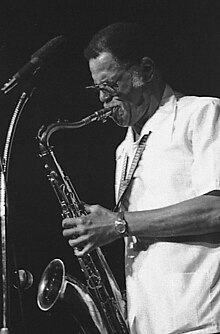Our website is made possible by displaying online advertisements to our visitors.
Please consider supporting us by disabling your ad blocker.
Dexter Gordon
This article needs additional citations for verification. (November 2023) |
Dexter Gordon | |
|---|---|
 Gordon in concert in Toronto on August 19, 1978 | |
| Background information | |
| Birth name | Dexter Keith Gordon |
| Also known as | Long Tall Dexter |
| Born | February 27, 1923 Los Angeles, California, U.S. |
| Died | April 25, 1990 (aged 67) Philadelphia, Pennsylvania, U.S. |
| Genres | Jazz, swing, bebop, hard bop |
| Occupation(s) | Musician, composer, bandleader |
| Instrument(s) | Tenor saxophone, soprano saxophone |
| Years active | 1940–1986 |
| Labels | Blue Note, Savoy, Columbia |
| Website | dextergordon |
Dexter Gordon (February 27, 1923 – April 25, 1990) was an American jazz tenor saxophonist, composer, and bandleader. He was among the most influential early bebop musicians. Gordon's height was 6 feet 6 inches (198 cm), so he was also known as "Long Tall Dexter" and "Sophisticated Giant". His studio and performance career spanned more than 40 years.
Gordon's sound was commonly characterized as being "large" and spacious and he had a tendency to play behind the beat. He inserted musical quotes into his solos, with sources as diverse as "Happy Birthday" and well-known melodies from the operas of Wagner. Quoting from various musical sources is not unusual in jazz improvisation, but Gordon did it frequently enough to make it a hallmark of his style. One of his major influences was Lester Young. Gordon, in turn, was an early influence on John Coltrane and Sonny Rollins. Rollins and Coltrane then influenced Gordon's playing as he explored hard bop and modal playing during the 1960s.
Gordon had a genial and humorous stage presence. He was an advocate of playing to communicate with the audience,[1] which was his musical approach as well. One of his idiosyncratic rituals was to recite lyrics from each ballad before playing it.[citation needed]
A photograph by Herman Leonard of Gordon taking a smoke break at the Royal Roost in 1948 is one of the iconic images in jazz photography.[2] Cigarettes were a recurring theme on covers of Gordon's albums.
Gordon was nominated for an Academy Award for Best Actor in a Leading Role for his performance in the Bertrand Tavernier film Round Midnight (Warner Bros, 1986), and he won a Grammy for Best Jazz Instrumental Performance, Soloist, for the soundtrack album The Other Side of Round Midnight (Blue Note Records, 1986). He also had a cameo role in the 1990 film Awakenings. In 2018, Gordon's album Go (Blue Note, 1962) was selected by the Library of Congress for preservation in the National Recording Registry for being "culturally, historically, or aesthetically significant".[3]
- ^ "Dexter Gordon interview with Les Tomkins, 1962". National Jazz Archive. March 11, 2020. Archived from the original on August 14, 2020. Retrieved March 6, 2021.
- ^ "From the Harvard Art Museums' collections Dexter Gordon, Royal Roost, New York City". Harvardartmuseums.org.
- ^ Andrews, Travis M. (March 20, 2019). "Jay-Z, a speech by Sen. Robert F. Kennedy and 'Schoolhouse Rock!' among recordings deemed classics by Library of Congress". The Washington Post. Retrieved March 25, 2019.
Previous Page Next Page


